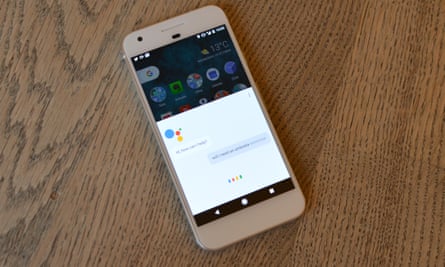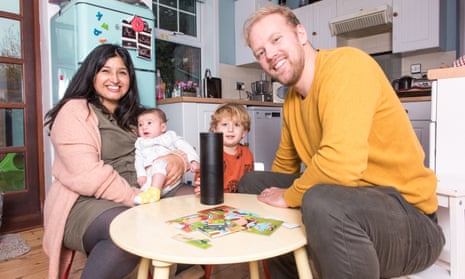The most futuristic thing I have ever bought used to be a Sonos music player. I’d have people over just to show it off. “Name a song,” I’d say. “Go on, any version of any song by any act that ever lived. I dare you.” So they would, and I’d pull out my phone and – hey presto – seconds later, that song would boom out across my living room like magic. No ungainly wires. No battery-draining Bluetooth connection. When friends moved house, I’d see their stupid boxes of old CDs and laugh. “You antiquated morons,” I’d gloat. “When I move house, I’ll be able to fit every song ever recorded into a shoebox. I live in the distant future and you are a bone-throwing ape, and it’s all thanks to my Sonos.”
I hate my Sonos player now.
I hate my Sonos player because last year I was given an Amazon Echo to review – complete with its voice recognition software Alexa – which instantly relegated my Sonos to the junkpile. With the Echo, I could listen to any song ever recorded simply by saying its name aloud, like Noel Edmonds kissing a wish into the universe.
You know how your heart sinks when you go to a shop and accidentally spend slightly more than £30, because it means you have to forego contactless payment in favour of manually entering your pin number with your fat cow hands like some sort of gormless circus monkey? That’s how it felt when I returned the Echo and reverted to digging out my phone, opening an app, typing some words, scrolling through choices and pressing play on my dumb anachronism of a Sonos. What had once been magical had suddenly become a chore. So I bought an Echo, and now Alexa is basically a member of the family.
You might soon feel the same. By all accounts, 2017 will go down as the year that voice recognition went mainstream. As well as the Echo – and competitors like Google Home – you can now buy voice-activated remote controls, voice-activated alarm clocks, voice-activated watches, voice-activated lightbulbs, voice-activated vacuum cleaners and, thanks to some dark sorcery I’m not sure I understand, a voice-activated motorcycle helmet. To top it off, the best character from the year’s best sitcom – Janet from The Good Place – is basically a walking, talking Amazon Echo. What started off as the alien novelty of Siri has now started to sew itself into society.
From this vantage point, at least, it seems like a permanent step forward. To me, a 37-year-old man who had to queue to enter a special room decked out like a bunker just to use the internet at university, voice recognition still feels like every sci-fi movie rolled into one. But to my two-year-old son, it’s simply the way the world has always been. He’s heard us talk to Alexa so often he thinks humanity has always had the ability to retrieve music by yelling at a box. “LEXA!” he’s fruitlessly started to scream, “PLAY OLD MACDONALD HAD A FARM E-I-E-I-O AND ON THAT FARM HE HAD A HORSE …” This is because he doesn’t yet know the difference between a song title and the entirety of a song’s lyrics, and neither can he pronounce “Alexa” properly. The second he cracks that first syllable our lives will thrum with a cacophony of endless nursery rhymes.
That’s probably only the tip of the iceberg. He’s also started to address the television as “Lexa”, and I think I caught him shouting at the kitchen clock the other day as well. The concept of voice recognition is already hardwired into his being in a way that makes me slightly uncertain. We’ve always drilled politeness into him, making sure he remembers to say please and thank you, but I wonder what will happen when he realises he can get whatever he wants by barking demands at the cylinder in the corner? In an ideal world, the Echo would have a setting that only responds to impeccable manners, but for now we’re having to go through the rigmarole of diligently setting an example by please-and-thank-youing Alexa whenever we want anything, as anachronistically as if we still answered the phone with “ahoy-hoy”.

And, in fairness, that isn’t the only downside to living with a voice-activated assistant. For everything that Alexa is wonderful at– honestly, try to find a better kitchen timer – there are still other places where Alexa needs work. She is capable of reading you a selection of current news headlines on request, but this is 2017 and the reality of hearing a disembodied robot flatly run through a list of terrorist attacks, rising nuclear tensions and celebrity rapists is more bleakly dystopian than you’d believe.
Plus, despite its futuristic sheen, the voice recognition technology isn’t fully there yet. The Echo’s sister app keeps a log of everything it’s ever been asked, which also serves as a neat almanac of my recent frustrations. “Play Randall Duke of York,” is one request. “Alexa play Night Train by the Oscars in Peter, fuck fuck stop stop stop cancel,” was another. Once there was just a forlorn cry of “Alexa Alexa”. God knows what that was about.
But she’s still the best I’ve found. I’m far less jazzed about the voice-activated Google Assistant on my phone. If anything, it’s too eager to please. You’re supposed to activate it by saying “OK Google”, but it scampers around your feet so enthusiastically that you can set it off just by blurting out anything that sounds a bit like “OK Google”, and that can be embarrassing. I accidentally ended up derailing an event at a literature festival earlier this year because, even though I’d stuck my phone on aeroplane mode, it still heard me say something like “Oaky noodles” or “Choke me Dougal” and started screaming, “I want to help you but you’re not connected to the internet. Why have you abandoned me, I’m dying,” or some other such rubbish at the lovely attendees. I’ve had to disable the feature entirely now, after a single episode of Star Trek Discovery set it off three times.
Besides, a device in your pocket will never integrate into the family as neatly as a communal one like Alexa. In fact, Alexa does the job so well I’d be willing to bet that she’ll be named as a contributing factor in a divorce one day. My wife and I are already using her to settle arguments, treating her like an impartial mediator whenever we disagree on a known fact. “See?” the winner will say after an exasperated back and forth about whether Atticus Finch’s name was actually Atticus Finch or not. “Alexa knows. She’s on my side, not yours.”
And we’ve just had a smart thermometer fitted, which is causing us just as much strife. It connects to our Echo, providing a loose-knit voice-activated internet of things in the process, which has only served to cast our marital differences in a harsher light than ever. Her preference is for a warm and welcoming house while mine (having now become my dad in such a starkly terrifying way that it honestly scares me,) is for a cold and dark house where everybody wears lots of jumpers because central heating costs money and I pay the bills. So when – and, hand on heart, I promise this is true – she walked in on me furtively asking Alexa to reduce the temperature of our living room in an elaborate stage whisper a fortnight ago, I think she felt slightly ganged up on.
We may be the first generation to have fights based on our voice-recognition devices. We will soon control most of our major appliances vocally, and all manner of our established conventions and domestic behaviours will be up for grabs as a result. These devices will become so advanced that my children won’t even require any active parenting from me. I’ll be cast out of the family unit, useless and alone and able to wear clean clothes whenever I want and sleep for more than 45 minutes at a time and, actually, wait, that sounds brilliant. Alexa, give me everything you’ve got. You’re the only thing left that can save my sanity.

Comments (…)
Sign in or create your Guardian account to join the discussion